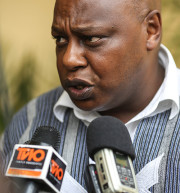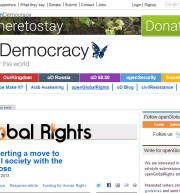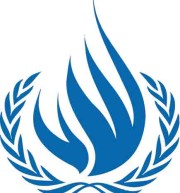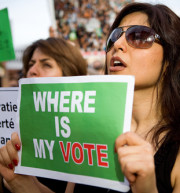• 1,000 troops seal off one of Bangkok’s busiest intersections to prevent a protest, as deputy national police chief says protests will no longer be allowed. “We have to keep the law sacred,” he says. (ABC News) • Cambodian court convicts 25 for "acts of violence" during garment strikes - then frees them (Reuters). Related: Jeans maker Levi-Strauss reduces sourcing from Cambodia to "minimize supply-chain risk." (just-style.com) • The Economist predicts Brazil protests unlikely to disrupt the World Cup, but an early exit for the national team could spur unrest. “Social movements are quietly cheering for Brazil to lose,” remarks one activist, “even to arch-rival Argentina.” • War widows from Libera’s 14 years of conflict protest for benefits. (ABC News) • Earlier this week: Oxfam’s former head of counter-fraud jailed for stealing from charity. Pled guilty in March to making £64,612.58 in payments to fictitious firms. (Civilsociety.co.uk) • Human Rights Watch’s Phil Robertson: US diplomats should speak up on Malaysia human rights abuses (The Malaysian Insider). Also from HRW: Kyrgyzstan should reject trio of repressive legislative proposals: A “foreign agents” law for NGOs accepting foreign money, a bill criminalizing “homosexual propaganda,” and new restrictions on... Continue reading →
GENEVA – Two United Nations independent experts on Friday expressed serious concern over the charges brought against three human rights defenders in the aftermath of the 2013 presidential elections in Azerbaijan. Mr. Anar Mammadli and Mr. Bashir Suleymanli, respectively Chairman and Executive Director of the Azerbaijani Election Monitoring and Democracy Studies Centre (EMDSC), together with Mr. Elnur Mammadov, President of the Volunteers of International Cooperation Public Union (VIC), are being tried in Baku for conducting business activity by an organized group without registration and abusing official powers, among other charges. They face up to 12 years’ imprisonment. Mr. Mammadli has been in pre-trial detention since 16 December 2013. “We are seriously concerned that the three human rights defenders are being prosecuted in retaliation for their legitimate work in documenting alleged widespread irregularities and human rights violations around the presidential elections of 9 October 2013. All charges brought against them should be dropped and Mr. Mammadli should be released immediately,” urged the UN Special Rapporteur on the rights to freedom of peaceful assembly and of association, Maina Kiai. Mr. Mammadli was one of the participants in the consultation convened by Mr. Kiai in June 2013 in Geneva in... Continue reading →
GENEVA – On the occasion of World Press Freedom Day, a group of 31 specialists - including Special Rapporteur Maina Kiai - from the largest body of independent experts in the United Nations Human Rights system called on all Governments to promote and protect the rights to freedom of expression and information, freedom of peaceful assembly, and freedom of association and public participation, essential for the full realization of all human rights for all and for the achievement of related development goals: “States must develop more inclusive political processes and allow the media to play a key role in guaranteeing the right of everyone, including those vulnerable to exclusion and discrimination, to freely access information and engage in meaningful development related discourse. Individuals and communities, including marginalized ones, must be empowered to claim their rights. Democratic, transparent and participatory decision-making related to sustainable development improves effective delivery of public services, reduces corruption and increases good governance at all levels. We are deeply concerned at the ongoing attacks on journalists and human rights defenders involved in demanding good governance and governmental accountability, fighting corruption and protecting the human rights of those living in... Continue reading →
The ability to seek, receive and utilize resources is an inherent part of the right to freedom of association. This shouldn’t be a controversial statement. By definition, organizations need resources – financial, human and material – to operate. Without money, staff and equipment, an association is reduced to an empty shell – a vehicle stripped of its engine, fuel and driver. Unfortunately, civil society’s ability to access resources is far from secure in today’s world. Restrictions on funding have in recent years become a major threat to associations in a range of countries across all regions of the world, as UN Special Rapporteur Maina Kiai has repeatedly pointed out. There is clearly a trend toward strangling civil society with the financial noose, and the trend is growing. There is an urgent need to further strengthen associations’ ability to access resources, and to protect it. In this spirit, the Special Rapporteur recently partnered with the Community of Democracies to launch a project dedicated to enhancing space for civil society, with a particular focus on the ability to access financial resources. More on the project – which is funded by the Swedish Ministry of Foreign Affairs— is available here. The centerpiece of the project will be a series of five regional dialogues led by Maina Kiai. These... Continue reading →

Kigali, 27 January 2014 I would like to thank the Government of the Republic of Rwanda for inviting me to carry out a visit to the country. I commend Rwanda for being the first country in Africa to extend an invitation to my mandate since its establishment by the Human Rights Council in October 2010. I thank the Government for its excellent cooperation before and during the conduct of this mission. I am most grateful to all interlocutors I have met. I had fruitful exchanges with the Prime Minister, the Minister of Justice, the Minister of Internal Security, the Minister of Local Government, the Minister of Public Service and Labour, the Minister of Trade and Industry, the Minister of East African Community, the Permanent Secretary of the Ministry of Foreign Affairs, and the Inspector General of Rwanda National Police. Moreover, I had the opportunity to meet with the Governor of the South Province and the Mayor of Huye. I also met the Chief Justice, the President of the High Court, the Prosecutor General, the Deputy Speaker of the Parliament, and the Chair of the Committee on Unity, Human Rights and fight against Genocide of the Chamber of Deputies and its members. I had meetings with the National Unity and Reconciliation Commission, the Director of the Directorate General of Immigration and Emigration, the Chief Executive... Continue reading →

A piece by Maina Kiai has been featured in openGlobalRights, a multi-lingual ezine that covers global human rights. In the article, Kiai discusses legislation introduced in Kenya that would have capped foreign funding to NGOs. The law looked to be a death-knell for a vibrant civil society sector that has long been a shining example for the region. Luckily, after sustained local and international pressure, the legislation was narrowly defeated in the National Assembly in December. Kenya is not out of the woods yet - the legislation may re-emerge next year. But Kiai argues that its experiences could be instructive for countries where civil society faces similar threats. Click here for a link to the piece. Update Jan. 13, 2014: The article is also now available in French.... Continue reading →
The rights to freedom of peaceful assembly and association are among the most important human rights we possess. Simply put, these rights protect peoples’ ability to come together and work for the common good. They are a vehicle for the exercise of many other civil, cultural, economic, political and social rights, allowing people to express their political opinions, engage in artistic pursuits, engage in religious observances, form and join trade unions, elect leaders to represent their interests and hold them accountable. Today, the rights to freedom of peaceful assembly and of association are enshrined in international law as fundamental freedoms. But their philosophical origins are not cultural, or specific to a particular place and time. Rather, these rights are born from our common human heritage, rooted in the simple fact that every civilization is built upon cooperation and collaboration, from many and not one. It is human nature – and human necessity – that people come together to collectively pursue their interests. Vibrant assembly and association rights are a prerequisite not only for a legitimate democracy, but also for a just society. The Right to Freedom of Peaceful Assembly The right to freedom of peaceful assembly is the right to gather publicly or privately and collectively express, promote,... Continue reading →
Mr. Maina Kiai was the United Nations Special Rapporteur on the rights to freedom of peaceful assembly and of association from 1 May 2011 to 30 April 2017. A lawyer trained at Nairobi and Harvard Universities, Mr. Kiai has spent the last twenty years campaigning for human rights and constitutional reform in Kenya – notably as founder and Executive Director of the unofficial Kenya Human Rights Commission, and then as Chairman of Kenya’s National Human Rights Commission (2003-2008), where he won a national reputation for his courageous and effective advocacy against official corruption, in support of political reform, and against impunity following the violence that convulsed Kenya in 2008, causing thousands of deaths. From July 2010 to April 2011, Mr. Kiai was the Executive Director of the International Council on Human Rights Policy, a Geneva-based think-tank which produces research reports and briefing papers with policy recommendations. Mr. Kiai was also the Director of Amnesty International’s Africa Programme (1999-2001), and the Africa Director of the International Human Rights Law Group (now Global Rights, 2001-2003). He held research fellowships at the Danish Institute for Human Rights (Copenhagen), the Woodrow Wilson International Center for Scholars (Washington), and the TransAfrica Forum (Washington). He... Continue reading →

A group of United Nations independent human rights experts, including Maina Kiai, expressed deep concern at the alleged ongoing judicial harassment, intimidation and abusive treatment directed against Issa Amro, a prominent Palestinian human rights defender. Mr. Amro was arrested and detained 20 times in 2012, and six times so far in 2013, although he has never engaged in violence nor been charged with a crime. He is a founder of non-governmental organizations Youth Against Settlements and Hebron Defenders. “Mr. Amro appears to be the victim of a pattern of harassment that includes an effort to intimidate him prior to his participation at the UN Human Rights Council in Geneva in June 2013 as NGO representative where he delivered two statements,” said the UN Special Rapporteur on the situation of human rights in the occupied Palestinian territories, Richard Falk. “Right before participating at this session of the Council, he received a summons to appear at Ofer Military Court on 30 December 2013,” Mr. Falk recalled. “At this point, there is no indication of any charges against Mr. Amro.” Over the past months, Mr. Amro has also received a number of death threats from settler organizations. “Among the most insidious features of the prolonged occupation of the West Bank has been the high degree of... Continue reading →

A group of United Nations independent human rights experts today warned that unreasonable limitations placed on the right of Iranian citizens to stand for Presidential office, discrimination against women candidates for elections and ongoing restrictions on freedoms of expression, association and peaceful assembly, constitute a serious violations of rights guaranteed by international law. On 21 May, the Guardian Council, a 12-member body of theologians and jurists, which vets presidential candidates, approved only 8 individuals out of the 686 people registered as candidates for the June 14 presidential elections. Several key political figures and all the 30 female candidates were disqualified, raising serious concerns about the fairness and transparency of the vetting procedures. Several candidates were apparently excluded on the basis of their affiliation with the 2009 post-election protests and their exercise of fundamental human rights, including the rights to freedom of expression, assembly and association. “This mass disqualification including that of women wishing to stand in the presidential elections is discriminatory and violates fundamental right to political participation, and run contrary to the International Covenant on Civil and Political Rights, which Iran has ratified,” said the Special Rapporteur... Continue reading →